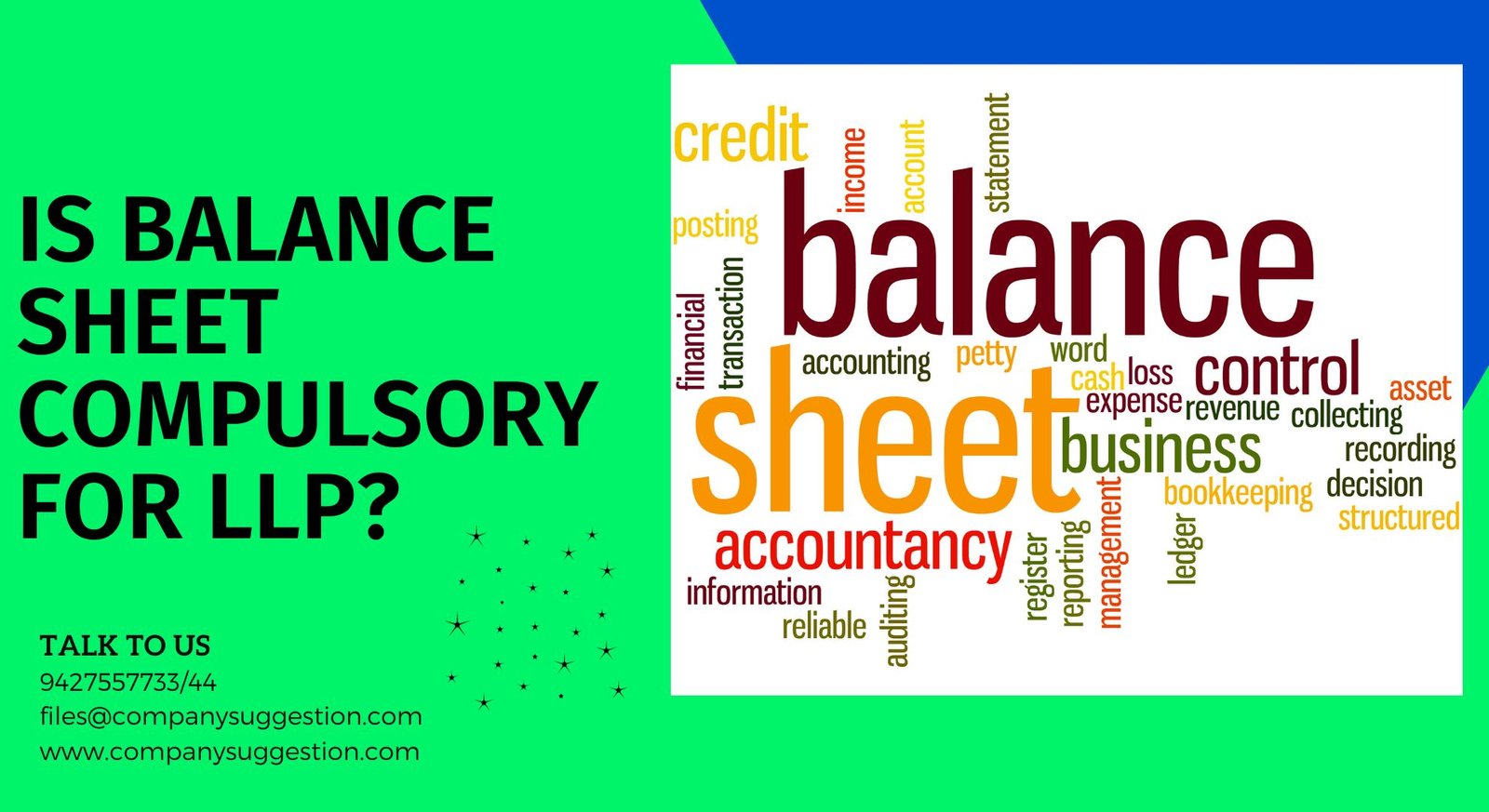Is Balance Sheet compulsory for LLP?
A balance sheet is a crucial financial statement for any business entity, including Limited Liability Partnerships (LLPs). It provides a snapshot of a company’s financial condition at a specific point in time, typically at the end of a fiscal year. Limited liability partnerships (LLPs) are not required to prepare and file a balance sheet with regulatory authorities, unlike companies. However, LLPs are required to maintain proper books of accounts, including records of their assets and liabilities.
Understanding LLPs in India:
A Limited Liability Partnership (LLP) in India is a popular business structure that combines the features of a traditional partnership and a private limited company. It provides limited liability to its partners and operates on the basis of a partnership agreement. Here are some key points to understand about LLPs in India:
1. Formation:
- Minimum Requirements: To form an LLP in India, there must be at least two designated partners, and there is no maximum limit on the number of partners. At least one of the designated partners must be a resident of India.
- Name: The name of the LLP should be unique and not similar to any existing company or LLP name in India.
2. Limited Liability:
- Limited Liability: One of the primary advantages of an LLP is that the partners have limited liability, which means their personal assets are protected in case the LLP incurs debts or liabilities.
3. Management and Decision Making:
- Partnership Agreement: The rights and duties of partners are governed by the LLP agreement, which is to be filed with the Registrar of Companies. This agreement can be customized as per the requirements of the partners.
- Management: Partners have the flexibility to manage the LLP directly or appoint designated partners to manage its affairs.
4. Compliance and Regulations:
- Annual Compliance: LLPs in India are required to file an annual return and a statement of accounts with the Registrar of Companies.
- Audit Requirements: LLPs meeting certain criteria related to turnover and capital are required to get their accounts audited by a qualified Chartered Accountant.
5. Taxation:
- Taxation: LLPs are taxed as a separate legal entity. The partners are not liable to pay tax on the income of the LLP. Instead, the LLP itself is taxed, and the partners receive their share of profits after tax deductions.
6. Conversion and Closure:
- Conversion: An existing partnership firm or an unlisted private company can be converted into an LLP.
- Closure: LLPs can be closed down voluntarily or by the order of the National Company Law Tribunal (NCLT). The closure process involves settling the debts and filing necessary documents with the Registrar of Companies.
7. Registrar of Companies (RoC):
- Regulation: LLPs are regulated by the Ministry of Corporate Affairs through the office of the Registrar of Companies (RoC).
- Filing Requirements: LLPs are required to file various documents, including annual returns and financial statements, with the RoC.
Importance of Maintaining a Balance Sheet:
Maintaining a balance sheet is crucial for several reasons, both for businesses and individuals. Here’s why it’s important:
1. Financial Health Assessment:
- Businesses: A balance sheet provides a snapshot of a company’s financial health at a specific point in time. It shows the company’s assets, liabilities, and shareholders’ equity, allowing stakeholders to assess its financial stability.
- Individuals: For individuals, especially those with complex financial portfolios, a balance sheet helps in understanding their net worth, which is essential for financial planning and decision-making.
2. Decision Making:
- Businesses: Entrepreneurs and managers use balance sheets to make critical decisions, such as taking loans, investing in new projects, or expanding operations. Lenders and investors rely on balance sheets to evaluate a company’s creditworthiness.
- Individuals: Individuals can use their balance sheets to make decisions about investments, managing debts, and planning for major life events, such as buying a house or retiring.
3. Performance Evaluation:
- Businesses: By comparing balance sheets over different periods, businesses can assess their growth, profitability, and efficiency. Ratios and trends derived from balance sheets (like debt-to-equity ratio) offer insights into a company’s performance.
- Individuals: Monitoring changes in personal assets and liabilities helps individuals track their financial progress and make adjustments to their financial strategies.
4. Legal and Tax Compliance:
- Businesses: Balance sheets are essential for regulatory compliance. They are required for filing taxes and adhering to accounting standards. Publicly traded companies, in particular, must maintain accurate balance sheets for shareholders and regulatory authorities.
- Individuals: While individuals might not have the same legal obligations as businesses, having an organized balance sheet can simplify tax filing and financial planning.
5. Credibility and Transparency:
- Businesses: Maintaining a transparent and updated balance sheet enhances a company’s credibility in the eyes of investors, creditors, and partners. It demonstrates a commitment to financial transparency.
- Individuals: Transparent financial records can be crucial in personal financial matters, such as during divorce proceedings or estate planning.
6. Risk Management:
- Businesses: A balance sheet helps in identifying potential risks and vulnerabilities. For instance, if a company has a high level of short-term debt compared to its assets, it might face liquidity issues.
- Individuals: By understanding their financial position, individuals can identify risks and take measures to mitigate them, such as investing in insurance or diversifying investments.
Benefits of Professional Assistance
Seeking professional assistance, whether it’s from accountants, lawyers, financial advisors, or other experts, offers numerous benefits for individuals and businesses. Here are some key advantages:
1. Expertise and Knowledge:
- They are up-to-date with the latest regulations, trends, and best practices, ensuring that you receive accurate and relevant advice.
2. Time and Resource Saving:
- Hiring professionals saves you time and effort. They can handle complex tasks efficiently, allowing you to focus on your core activities, whether it’s running a business or managing personal matters.
3. Customized Solutions:
- Professionals analyze your specific situation and provide tailored solutions. They consider your unique needs and goals, offering personalized advice and strategies that suit your circumstances.
4. Legal Compliance:
- Professionals ensure that you comply with relevant laws and regulations. This is crucial for businesses to avoid legal issues and financial penalties. Individuals also benefit from expert knowledge about tax laws, estate planning, and other legal matters.
5. Strategic Planning:
- Professionals assist in long-term strategic planning. They help businesses create financial forecasts, budget effectively, and plan for growth. Individuals can receive guidance on retirement planning, investment strategies, and wealth management.
6. Objective Perspective:
- Professionals offer an objective viewpoint. They can assess situations without emotional attachment, providing unbiased advice. This objectivity is especially important in financial decision-making.
7. Problem-Solving:
- When challenges arise, professionals can help navigate difficult situations. They have experience dealing with various issues and can provide solutions to problems that might seem insurmountable.
8. Risk Management:
- Professionals help businesses and individuals identify and manage risks. They can provide insights into potential risks and advise on measures to mitigate them, protecting you from financial losses and legal complications.
9. Networking Opportunities:
- Professionals often have extensive networks. They can connect you with other experts, potential clients, or business partners, expanding your opportunities and opening doors to new ventures.
10. Peace of Mind:
- Knowing that qualified professionals are handling your financial, legal, or business matters provides peace of mind. It reduces stress and allows you to focus on what you do best, whether it’s managing a business or enjoying personal pursuits.
Company Suggestion provides services of Compliances services along with same Income Tax Returns, GST Registration or Returns etc.
Our experts of team will guide you related to compliances of Companies, Firms and other entities if you have any doubt regarding this, then you can send your doubts on company suggestion and clear it.












